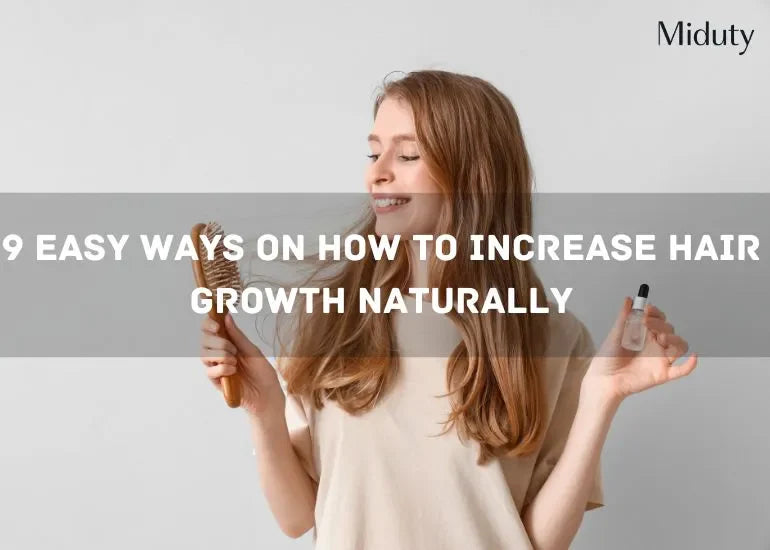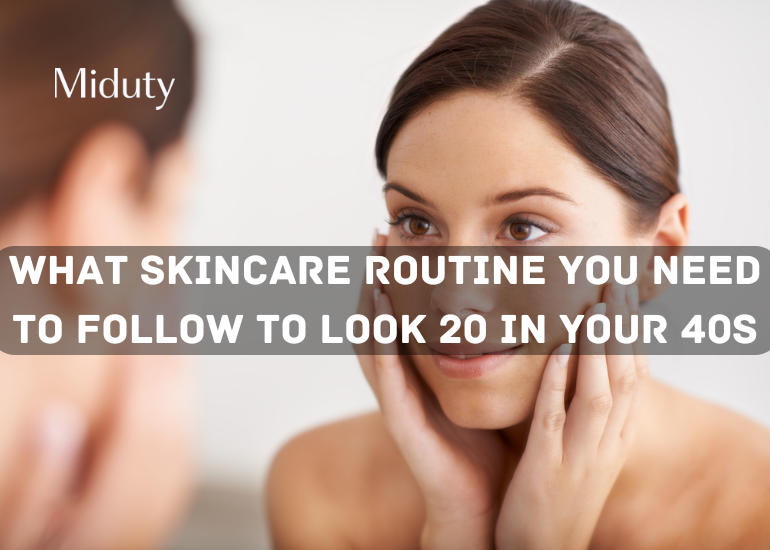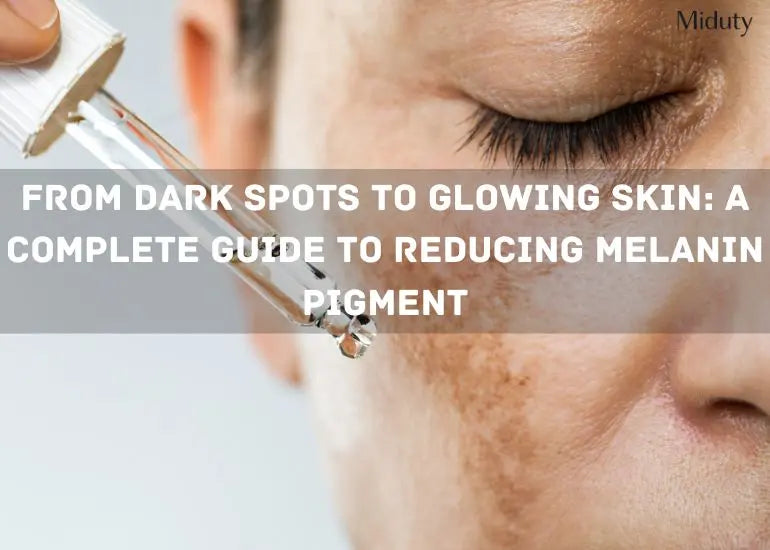
9 Easy Ways on How to Increase Hair Growth Naturally
Key Takeaways
1) Hair Growth Is a Two-Way Process: It's not just about external products but also about nourishing your body from within to achieve healthier hair.
2) The Importance of a Balanced Diet: Nutrients like protein, biotin, iron, and omega-3 fatty acids play a crucial role in supporting hair strength and growth.
3) Focus on Scalp Health: A healthy scalp is essential for optimal hair growth, making scalp massages, proper exfoliation, and oiling non-negotiable steps.
4) Consistency Matters: Natural remedies take time, but sticking to a routine yields visible results in hair thickness and health over the months.
5) Holistic Hair Care Wins: From diet and supplements to managing stress and protecting your hair from heat and environmental damage, a multi-faceted approach ensures long-term success.

We've all been there—brushing your hair or running your fingers through it, only to see a handful of strands fall out. Or maybe you've noticed more hair in the shower drain than you'd like to admit. It's frustrating, and over time, it can really chip away at your confidence. You might even try every expensive shampoo and serum on the market, hoping for a miracle, but the results never seem to live up to the hype.
The truth is, while the right hair care products can help, improving hair growth is a two-fold process. It's not just about what you put on your hair, but also how you nourish your body from the inside.
In this blog, we'll dive into 9 easy ways to improve hair growth naturally, focusing on both external and internal approaches to bring out your hair's full potential. Ready for healthier, thicker hair? Let's get started
Table of Contents
1. How Does the Hair Growth Cycle Work?
2. How to Increase Hair Growth Naturally?
3. Conclusion
4. FAQs on How to Improve Hair Growth
5. References
How Does the Hair Growth Cycle Work?
The hair growth cycle is a continuous process that involves three distinct phases, each playing a crucial role in how your hair grows and sheds. Understanding this cycle can help you appreciate why hair growth takes time and why proper care is essential. Here's a breakdown of each phase:
1) Anagen (Growth Phase): This is when your hair is actively growing. It lasts 2 to 6 years and determines how long your hair can get.
2) Catagen (Transitional Phase): A short phase lasting 2-3 weeks, where hair stops growing and the follicle shrinks.
3) Telogen (Resting Phase): The hair rests for about 3 months before it falls out to make room for new growth.
Understanding these stages helps explain why hair growth takes time and the importance of proper care.
At any given time, about 85-90% of your hair is in the anagen phase, while the rest is in the catagen or telogen phases. After shedding, the cycle begins anew with fresh hair growth.
Read Also: Top 6 Vitamins for Hair Growth and Thickness That Actually Works
How to Increase Hair Growth Naturally?

1. Start with Your Diet
The foundation of healthy hair begins with what you put on your plate. Hair is primarily made of keratin, a fibrous protein that gives each strand its strength and structure. Since hair is made up of 97% protein and 3% water, it's essential to include 40-50% protein in your diet to support healthy hair growth.
Think of keratin as the building block of your hair—a strong foundation that determines how well your hair grows, resists damage, and maintains its natural shine.
Although protein plays an important role in hair health, there are other essential nutrients like iron, zinc, omega-3 fatty acids, and DHA that contribute equally to maintaining strong, healthy hair. These minerals and healthy fats support various functions, such as improving blood circulation to the scalp and promoting overall hair vitality.
- Protein: Hair follicles are mostly protein, so include foods like eggs, chicken, fish, beans, and in your meals. Insufficient protein can cause hair thinning. Additionally, you can also include a high-quality protein shake to curb deficiencies. [1]
- Iron: Iron-rich foods like spinach, kale, and lentils, ensure oxygen reaches your hair follicles. Low iron levels are a common cause of hair loss. [2]
- Omega-3 Fatty Acids: Found in walnuts, chia seeds, and fatty fish like salmon, these fats nourish your scalp and add shine to your hair. [3]
- Biotin and Zinc: Biotin (found in nuts and eggs) helps with keratin production, while zinc (found in seeds like pumpkin seeds, flax seeds, and legumes like masoor daal, urad daal ) supports follicle health and reduces shedding.
- B Vitamins: B vitamins, including B6, B12, and folate, are essential for hair health as they help red blood cells carry oxygen to the hair follicles. Include foods like leafy greens like spinach, kale, swiss chard, eggs, and legumes such as lentils, chickpeas, and beans to ensure you're getting enough of these nutrients.
- Hydration: Apart from drinking water, you can stay hydrated by including hydrating foods like watermelon, cucumber, and oranges in your diet, sipping on herbal teas or coconut water, and using electrolyte-rich drinks to replenish lost fluids.
2. Focus on Scalp Health

Your scalp is the soil where your hair grows. A healthy scalp leads to better hair growth, while an unhealthy one can stunt growth and cause hair loss. To promote a healthy scalp, you can perform these practices:
- Scalp Massages: Massaging your scalp daily increases blood flow to hair follicles, encouraging growth. Use your fingertips or a scalp massage for 5–10 minutes. [4]
- Oiling with Benefits: Oils like coconut, castor, and rosemary are excellent for scalp care. Rosemary oil, in particular, has been shown in studies to be as effective as minoxidil for promoting hair growth.
- Scalp Exfoliation: Weekly exfoliation removes product buildup and dead skin cells that can clog follicles. Use a gentle scrub or exfoliating shampoo.
3. Deep Conditioning with Hair Masks
Hair masks are like a spa day for your hair, offering deep hydration and repairing damage. Here are some powerful DIY recipes:
- Avocado and Coconut Oil Mask: Mix one mashed avocado with two tablespoons of coconut oil. This mask hydrates, repairs, and strengthens hair. Leave it on for 30 minutes before rinsing. [5]
- Banana and Honey Mask: Mash one banana and mix it with two tablespoons of honey. This mask moisturizes and promotes shine. Apply weekly for silky smooth results.
These natural masks are free of harsh chemicals and nourish your hair from root to tip.
4. Trim Regularly for Length Retention
Contrary to popular belief, trimming your hair doesn't make it grow faster. Hair growth occurs at the scalp level, and trimming doesn't impact that process. However, regular trims are important for maintaining the health of your hair.
Cutting off split or damaged ends prevents them from traveling up the hair shaft, which can lead to further breakage and thinning. By trimming every 6–8 weeks, you help keep your hair looking fresh and full, allowing it to grow without being hindered by damage.
5. Limit Heat Styling
Overusing hot tools like flat irons, curling wands, and blow dryers damages your hair's cuticle, leading to dryness and breakage.
- Always apply a heat protectant spray or cream before styling: Heat protectants not only shield your hair from damage but also lock in moisture, keeping your strands hydrated. They help to smoothen the hair, reducing frizz and promoting a shinier, healthier look even after styling with heat.
- Stick to medium or low temperatures when using styling tools: Lower heat settings still allow you to achieve great styles but with less risk of damage. By using a gentler temperature, you prevent excessive heat from stripping your hair of its natural oils, which helps maintain its softness and elasticity over time.
- Let your hair dry naturally as often as possible to minimize heat exposure: Air drying gives your hair a chance to retain its natural shape and texture, which helps preserve its overall health. It's a simple, yet effective way to avoid the daily wear and tear caused by blow dryers, allowing your hair to stay stronger and more resilient in the long run.
Read Also: 8 Best Essential Oils for Hair Growth: Natural Solutions for Fuller Hair
6. Protect Your Hair from Environmental Damage
Sun, wind, pollution, and chlorine are often overlooked culprits of hair damage. Here's how to shield your hair:
- Use a leave-in conditioner or hair serum with UV filters to prevent sun damage: These products help form a protective barrier that blocks harmful UV rays, which can dry out your hair and fade its color. Regular use ensures that your hair stays moisturized, vibrant, and shielded from the sun's harmful effects.
- Wear hats, scarves, or caps when exposed to the sun or pollution for long periods: Covering your hair not only prevents environmental damage but also helps reduce exposure to pollutants that can weaken the strands. This simple step can protect your hair from becoming dry, brittle, and prone to breakage.
Try Miduty's Thick and Grow
7. Boost Growth with Hair Supplements
Even with a healthy diet, it can be challenging to meet all your nutritional needs. Supplements can fill the gaps and supercharge hair growth. Look for supplements containing:
- Biotin: Known as the "hair growth vitamin," biotin plays a vital role in the production of keratin, the protein that makes up the structure of your hair. By improving the keratin infrastructure, biotin strengthens hair follicles, reducing breakage and promoting longer, healthier hair. [6]
- B Vitamins: B vitamins play a key role in promoting healthy hair growth by nourishing hair follicles and supporting overall scalp health. Vitamin B5 (Pantothenic Acid) helps increase blood flow to the scalp, delivering vital nutrients to the hair follicles, which can reduce thinning and encourage growth. Vitamin B6 (Pyridoxine) improves oxygen circulation to the scalp by supporting hemoglobin production, helping to keep hair healthy and strong. Vitamin B12 is essential for red blood cell production, ensuring that hair follicles receive enough oxygen and nutrients. Additionally, folate (B9) aids in cell division, stimulating hair follicle growth and repair, while also helping to prevent premature graying. By ensuring a proper intake of B vitamins, you can support stronger, healthier hair and reduce hair loss.
- Collagen: Collagen is a key protein that supports the structure of your hair follicles and helps maintain their strength. It promotes elasticity in the hair, preventing brittleness and breakage. Collagen also contains amino acids like proline, which is essential for the formation of keratin, leading to stronger, more resilient hair.
- Vitamin D: Vitamin D is crucial for the healthy functioning of hair follicles, and its deficiency has been linked to hair loss, including conditions like alopecia. Adequate levels of vitamin D help to stimulate the production of new hair follicles and support existing ones. When you're deficient in vitamin D, the hair growth cycle can become disrupted, leading to hair thinning or excessive shedding.
- Iron and Zinc: Iron is essential for carrying oxygen to the hair follicles, which is critical for maintaining hair growth. Without enough iron, hair follicles can become weak, leading to thinning and shedding. Zinc, on the other hand, plays a vital role in tissue growth and repair, including the health of hair follicles. It helps regulate the production of oils that keep the scalp moisturized, preventing dryness and hair loss.
- Omega-3 DHA: Omega-3 fatty acids, particularly DHA (docosahexaenoic acid), are vital for nourishing the scalp and encouraging healthy hair growth. These healthy fats improve circulation in the scalp, ensuring that hair follicles receive the nutrients they need to thrive. Vegan omega-3 supplements, which are derived from algae, provide an excellent plant-based alternative to traditional omega-3 sources like fish oil.
A supplement that combines DHT blockers with D-biotin is highly recommended. D-Biotin is easily absorbed and helps promote healthy hair growth, while DHT blockers prevent hair thinning caused by hormonal imbalances.
8. Prioritize Sleep and Stress Management

Your body repairs itself during sleep, and this includes your hair follicles. Stress, on the other hand, can trigger hair loss conditions like telogen effluvium.
- Quality Sleep: To improve sleep, reduce screen time at least an hour before bed to avoid disrupting melatonin production. Dim the lights and create a calming atmosphere with soft lighting to signal to your brain it's time to unwind. Additionally, ensure your bedroom is cool, quiet, and free from distractions for optimal rest. Aim for 7–8 hours of uninterrupted sleep each night. Invest in a silk pillowcase to reduce friction and prevent breakage.
- Stress Reduction: Practice yoga, meditation, or even take up a relaxing hobby like gardening or painting. Regular exercise also helps regulate stress hormones that can affect hair health.
9. Consistency is Key
While natural methods are effective, they require patience. Hair typically grows about half an inch per month, so visible results take time. Stick with your routine, and over the months, you'll notice a difference in your hair's health and growth.
Conclusion
Achieving healthier, thicker hair naturally is not an overnight process, but with consistent care and the right practices, it's achievable. By combining a nutrient-rich diet, a healthy scalp routine, protective styling, and a focus on your overall well-being, you're giving your hair the best chance to thrive.
Remember, the secret lies in balance—nourishing your hair both inside and out while staying patient and committed to your routine. Whether it's a relaxing scalp massage, a DIY mask, or simply getting enough sleep, every small effort adds up over time. So, take that first step today, and let your journey to stronger, more luscious hair begin!

Frequently Asked Questions on How to Improve Hair Growth -
Q1 - Can thin hair become thick again?
Yes, thin hair can become thicker with the right care. Focus on a nutrient-rich diet, scalp health, and consistent use of growth-boosting products like oils and supplements to strengthen hair follicles and improve density over time.
Q2 - How to regrow a hairline?
To regrow a hairline, maintain a healthy diet, massage the scalp with growth-stimulating oils like rosemary, and consider hair growth treatments or supplements. Consistency and patience are key.
Q3 - Can lack of sleep cause hair loss?
Yes, lack of sleep can cause hair loss by disrupting the hair growth cycle and increasing stress levels, which can lead to conditions like telogen effluvium. Quality sleep is essential for healthy hair.
Q4 -Does coconut oil thicken hair?
Coconut oil doesn't directly thicken hair, but it strengthens and nourishes the strands by reducing protein loss, which can make the hair appear healthier and fuller over time.
Q5 - Is rice water good for hair?
Yes, rice water is good for hair. It contains amino acids, antioxidants, and vitamins that can help strengthen hair, improve elasticity, and promote growth. Regular use may lead to smoother, shinier, and healthier-looking hair.

References
| Sr. No. | Reference Links |
| 1. | Diet and hair loss: effects of nutrient deficiency and supplement use |
| 2. | Iron Plays a Certain Role in Patterned Hair Loss |
| 3. | Effect of a nutritional supplement on hair loss in women |
| 4. | |
| 5. | |
| 6. |








